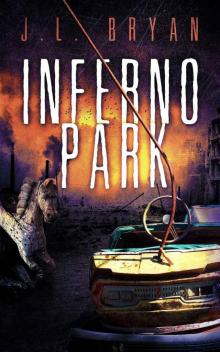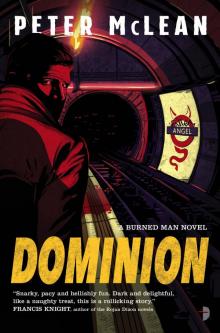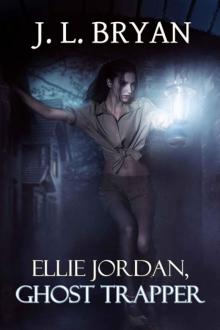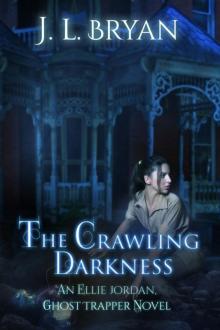Ellie Jordan, Ghost Trapper Read online
Page 8
“You’d better, or I’m not paying a dime,” Dale said.
“I understand, Mr. Treadwell.”
Stacey sighed as we pulled away in the van.
“That pretty much sucked. We look like amateurs,” said Stacey, who’d been on the job for a whole three weeks.
“We’ll take care of everything tonight,” I told her.
We each had time to shower and nap before our lunch appointment with Grant. He wanted to meet at the Olde Pink House by Reynolds Square, which wasn’t exactly the cheapest spot in town, but his information was free so we couldn’t complain too much. He often insisted on picking up the check, anyway, with a large tip and a patrician indifference to the size of the bill. It’s handy to come from old money, or so I assume. Grant was nominally an attorney, but I’m not sure how much time he spent doing any actual lawyering.
If you’re not familiar with Savannah, the Historic District is laid out in twenty-two squares, following the planned grid initially laid down by the colony’s founders in 1733. The squares are essentially little parks with gardens, brick paths, some very tall trees, and sometimes fountains, statues, features like that. They’re usually surrounded by beautiful old mansions and churches, built in every imaginable architectural style. Reynolds Square’s main adornment is a statue of John Wesley, the founder of Methodism, who lived right on that spot.
The Olde Pink House sits across from the square, an eighteenth-century Georgian mansion fronted with a Greek portico. The house is clad in a layer of stucco—I’ll let you guess what color. The building might be more formally called the James Habersham house, after its first owner, who is supposed to haunt the house to this day. Nearly every building in the sprawling Historic District is said to have a ghost or ten. That keeps me busy.
Grant Patterson was already there, seated at one of the cheerful little outdoor tables, wearing dark glasses against the bright sunlight. As always, he looked perfectly put together: graying brown hair crisply coifed, his white summer suit and peachy silk shirt spotless, golden cufflinks polished, nails manicured.
I wished I ever looked that good when I left the house. I’m usually dashing around in old jeans with my hair in loose brown tangles around my face. Today, though, I’d put on some half-decent linen slacks for our lunch.
“There you are,” Grant said as Stacey and I arrived together. Stacey had a light, breezy blue cotton dress that looked great on her. I don’t do light and breezy. Or dresses, unless I have to.
“Thanks for meeting with us, Grant,” I said. “It sounds like you put a lot of work into this.”
“Digging up dirty, long-forgotten gossip and rumors hardly feels like work, dear,” he said, rising to greet me. He looked at Stacey while he gently shook my hand. “Who is this pretty little thing?
“Stacey Ray Tolbert. Eckhart just hired her.”
“Oh, a new little ghost hunter,” Grant said, smiling as he shook her hand. “Goodness knows our city could use a few more. How is Calvin? Too busy for lunch, I see.”
“Still trying to make his retirement happen,” I said.
“And that explains the new girl.”
We took our seats as the waitress arrived. Grant was starting lunch with a Bloody Mary. I ordered coffee.
“I suppose we should get right to it,” Grant said. “The Marsh house. Do you want the long version, or should I skip to the dirty parts?”
“Let’s start with the dirty parts,” I replied. Stacey snickered a little.
“I hoped you’d say that.” Grant’s eyes seemed to shine as he took a goodly sip of Bloody Mary. I wondered if it was his first drink of the day. “So. Augustus Marsh, born to a very minor family in 1848, joins the nautical life early, serves in the Confederate Navy. After that, a steamship captain—most of his routes would have been nothing too glamorous, hauling produce from the South up to Boston and New York so those folks could eat something besides fish. He may have traveled a bit farther—into the Caribbean, perhaps across the Atlantic. Records are spotty.
“He may have been involved in some sort of smuggling, because he amassed quite a lot of money. Bought that estate west of town, when the land was mostly woods and marsh, and built that house for his new bride. In 1890, he marries Eugenia Bremmer, daughter of a small-time shopkeeper. At nineteen, she’s literally less than half his age. A bit of a beauty, from what anyone remembers, and she’s devoutly religious and starts giving his money to the orphanage and other charities.
“Here’s where the story turns dark,” Grant said, relishing the moment. “In 1901, she develops an illness and dies almost overnight. Some people suspected Captain Marsh had poisoned her.”
“Do you think it was murder?”
“I wouldn’t know, but the examining doctor was a friend of the Captain’s, and often attended the debauched parties at the mansion after the wife died. Captain Marsh did have a couple of possible motives to murder his wife.”
“Like what?” I asked, and then the waitress arrived to take our lunch order. I’d barely looked at the menu. I asked for she-crab soup, Stacey ordered a wedge salad, and Grant asked for their BLT salad with fried green tomatoes. The waitress frowned a little as she left—soups and salads for lunch don’t lead to a large bill.
“You should come here for supper sometime,” Grant advised us. “The seared sea scallops—amazing.”
“Why would Marsh kill his wife?” I asked.
“Oh, well, nobody can say for sure that she was murdered, first of all. If she was, though, it could be because she was aggressively giving away his money, or because she failed to provide him any children. The soil at the Marsh estate was rich, dark, and fertile, and the crops grew tall, but nothing grew inside poor Eugenia except religious feeling and charity. So she’s giving away all his money and not giving him any heirs. After eleven years of that, maybe he decides to poison her and have his doctor friend cover it up. Maybe not. It’s interesting to speculate.” Grant raised his eyebrows, watching for my reply.
“Is this the dark, sordid history you were hinting about?” I asked him. “It doesn’t sound like much. One possible murder?”
“Oh, no, dear.” Grant leaned back, smiling like I’d stepped into some little conversational trap he’d set. “Not at all. The scandals begin after Eugenia died. Apparently all the godliness left the house with her.”
Stacey inclined her head a little closer to Grant, listening intently.
“The marriage must have reined in Captain Marsh’s lower instincts, you see,” Grant continued. “After she was gone, he did not seem interested in remarrying. Within a year or two, his house had become a den of excess for young men of wealthy families. There was drinking, gambling, possibly opium, and certainly girls. His home evolved into something of a high-class brothel.” Grant delivered this with a satisfied smile.
“Did anyone else die there?” I asked.
“My, aren’t we all business?” Grant shook his head. “Over time, as Marsh’s reputation grew worse and worse, the parties at the Marsh mansion lost that ‘high-class’ tone. He gambled away much of his money and land, and his former gardens and fields became warehouses and factories. The crowd at his mansion grew, let’s say, less civilized year by year. Yet the dirty festivities never stopped, though Marsh grew older and older. It’s shocking he lived past a hundred. In fact, it’s amazing he lived past fifty, given his reputation for drinking, feasting, smoking, and keeping company with the professional ladies.
“Even when he died—you must know this by now—it had nothing to do with his health and lifestyle. He was stabbed to death by one of his working girls in 1954.”
“Mercy Cutledge,” I said. “A household servant, right?”
“Well, she did live there, but she was no maid,” Grant said. “She performed other services for Marsh and his, well, gentleman visitors.”
“Oh, wow.” Stacey looked at me with wide eyes. “We didn’t know that.”
“So why would Mercy kill him?” I asked.
“One can imagine any number of conflicts arising in that situation,” Grant said. “However, what she told the police, after they arrested her, was that the elderly Captain Marsh was an ‘occult wizard in league with demons.’” Grant looked amused as he said it. “Her exact words.”
“Was her claim investigated?” I asked, just in case, and Grant laughed.
“Well, no,” he said. “When you stab an old man to death, then tell the police about black magic and demons, they tend to call in the psychiatrists, not the demonologists. To answer your question, though, nobody can remember any evidence or corroborating witnesses, and I’ve spoken to a few very old folks who were alive then. The judge decided she’d flipped her lid, and people generally seemed to agree with the verdict. They shipped her off to Lassiter State Asylum near Milledgeville.
“Marsh’s grand-niece, Louisa, inherited the big old house and ran it as a boarding house. Apparently the house continued to attract the lowest sort of people during her era. Drifters, drug addicts, prostitutes. It’s a wonder the city didn’t shut it down earlier than they did. There were more deaths there, you’ll be interested to know. Murders, overdoses, suicides. The house seems to have been a magnet for misery.
“Now, Lassiter State Asylum abruptly closed in 1982. Budget cuts. A whole flock of loonies was released that year. And I suppose you know she returned to the scene of her crime and hanged herself. The city told Louisa Marsh she would have to bring the rotten old house up to code if she wanted to continue renting it out—really, I think, they just wanted to finally close the place down. Louisa stopped renting rooms and eventually sold the house and moved away. Since then, the house has changed owners several times, with nobody settling in for very long.”
“Did Louisa experience anything unusual in all those years?” I asked.
“It’s possible, but I couldn’t find anyone still living who knows much about her,” Grant said. “Maybe you could ask her yourself. She’s still alive, in a nursing home in Waycross. I have the information in your file folder, don’t let me forget.” He tapped his briefcase, down on the bricks beside his chair.
“Thanks,” I said. “I wonder if she’s the one who divided the house.” I described how the east wing was walled off from the main house except for one thick security with multiple locks.
“Maybe she was trying to lock out ghosts,” Grant said, looking amused.
“Or, from what you’ve told us, maybe she wanted security against her own tenants,” I said.
“Or both!” Stacey offered.
“Mercy didn’t die until 1982,” I said, “So I’m betting Louisa divided the house to protect herself against her living tenants, not Mercy’s ghost. We’re pretty certain Mercy is the one haunting the house. She’s rejected our invitation to scoot out of there peacefully and quietly. What we could really use now is some kind of object that belonged to her in life. Anything of significance that might draw her interest. Bait for a ghost trap.”
Grant blew between his lips and shook his head.
“That’s a tall order,” Grant said. “Maybe Calvin has a friend who can dig through old police evidence storage, but we’re talking about an open-and-shut murder from sixty years ago…”
“Calvin’s doing that,” I said. “Any other ideas? Where did Mercy live before the Marsh house? Where did she grow up?”
“I wish I could help.” Grant tapped his fingers on the table, thinking. “Nobody I spoke to knows where she came from—there’s an idea she came from a farm in central or west Georgia, probably looking for some city adventures, but that’s all I’ve heard. If you can’t find out from her police records, you might track down her doctor from the asylum, if he’s still alive. Or check the records at the asylum yourself.”
“But you said it closed in 1982.”
“Exactly. Closed, but neither demolished nor refurbished. Left to rot instead. You may find it’s a little bit of a time capsule inside, if vandals or arsonists haven’t destroyed it.”
“Wait,” Stacey said. “You’re suggesting we break into an abandoned mental hospital—”
“I suggest no such thing, dear girl!” Grant shook out his cloth napkin and laid it on his lap as our food arrived. “I’m simply sharing what I know. The two of you can do whatever you think best. Don’t these tomatoes look delicious? A crispy golden crust on the outside, sweet and juicy on the inside. My mother used to make them with these big red homegrown beauties from her garden. Try one, Ellie.” Before I could reply, he transferred one of the fried green tomato slices from his plate to the edge of my soup saucer.
“You said there were more deaths in the house,” I said. “What do we know about them?”
“As I said, drifters, drug addicts, and good-time girls,” Grant said. “Not the sort of individuals closely tracked by the newspapers. We do know it was considered a dangerous place, renting rooms to the rougher sorts.”
“Sounds like it could be a very haunted house,” Stacey said.
“We’ve only seen one ghost so far,” I told her. “No need to panic our clients with too many extra details right now. All we have to do is remove the ghost of Mercy Cutledge, and their house should fall quiet.” I looked at Grant. “Is there anything else you can tell me about her?”
“I have heard that Captain Marsh was stabbed to death while lying asleep in his bed,” Grant said. “Do be careful with this ghost, Ellie. She sounds like a nasty one to me.”
Chapter Eleven
Tips for breaking into an abandoned mental hospital: first, get permission from the current owner, probably a bank or government agency. Second: go during the daytime. Third: go with a large group.
Stacey and I followed one of these three suggestions. We wanted to get over there and back before sunset, and Milledgeville is two hours from Savannah if you stomp on it. I drove my Camaro to make better time. The company cargo van is a reliable old horse, but a slow one.
Naturally, zipping out to a dark, long-abandoned loony bin on a likely wild goose chase was not how I would have preferred to spend my afternoon. Calvin had tugged at his contacts in the police department, but if there was anything belonging to Mercy in deep storage somewhere, it was going to take days to even find out if it still existed.
It would have been handy to find the butcher knife she’d used to stab Captain Marsh, or some related piece of evidence. Her ghost wouldn’t be able to ignore a highly personal object like that, but we didn’t want to make our clients wait.
We had other options. According to police records, Mercy was originally from Camilla, a little peanut-and-cotton town in deep southeastern Georgia, two hundred and fifty miles away. Not exactly an afternoon trip. Plus, it would take some poking after we arrived there, since nobody named Cutledge currently resided in the town, as far as we could find. I’d put in some calls to local police and newspapers trying to find out about her family. If anyone was going to call me back with useful information, they hadn’t done it yet.
We could poke around the Treadwells’ house for any remnant of Mercy’s life, but it would be better to find an artifact she hadn’t encountered in many years, rather than something that was located in the same house she’d been haunting for the past three decades. It would be more likely to grab her attention.
For now, the old hospital seemed like the best bet. We could get out there and back in half a day. Even if we didn’t find any of Mercy’s personal belongings, we could probably find all kinds of artifacts that would be familiar to her. She’d spent more of her life there than anywhere else.
Calvin had also pushed for me to meet with the supposed psychic guy again, but I was still resisting. I just think a self-proclaimed psychic walking around my client’s home had too much potential to muddy the waters, and it seemed like we would soon be closing the case, anyway.
The dark, massive shape of Lassiter State Asylum squatted on a lot badly overgrown with waist-high weeds, brambles, and tall pine saplings that were well on their way to becoming trees. A chain-link fence surrou
nded the complex of old brick buildings. We were heading for the central administration building, which was four stories at the center with two-story wings sprawling out on either side. The windows were all barred, and the building resembled an old fortress covered with graffiti.
“Looks inviting,” Stacey said, taking a picture as we drove past. “You think they have greeters at the front like Wal-Mart?”
“I hope not.” I pulled off the single-lane country highway and onto a service road that took us around back. There was no good reason to park out front and advertise our presence to local police. It would have been handy to get permission first, but who has time for red tape?
The service road was badly overgrown and potholed, so we drove slowly, mowing down high weeds as we went. Not exactly inconspicuous, leaving a wide, broken trail behind like that. I hoped no police or security-conscious citizen happened to notice.
We parked at the back of the chain-link, where sections had been ripped open by years of weather and trespassers. Stacey frowned as we stepped out of the car. The empty buildings loomed ahead of us, casting deep shadows like the towers of a crumbling fortress.
“You think it’s safe in there?” she whispered, even though we were a long walk from the building. “What about, like, dangerous vagrants and drug addicts?”
“You should go to kickboxing class with me.” I opened my black toolbox in the trunk and began to load things onto my belt—my SWAT flashlight, Mel Meter, night vision goggles. I have a utility belt that would make Batman jealous, but I rarely use it because it’s uncomfortably heavy.
“That’s your plan? Seriously?” Stacey gaped at me while grabbing out her own tactical flashlight and a backpack.
“I also brought this.” I showed her my stun gun and thumbed the button. An arc of electricity crackled between the two sharp little metal prongs.
“Does that work against ghosts, too?” Stacey asked.
“I haven’t tried it.” I holstered it on my belt. “Interesting idea, though. It could disrupt their electromagnetic fields. Let’s get moving, the daylight’s slipping.” It was already mid-afternoon and our shadows were long and dark.

 Ghost Trapper 12 The Necromancer's Library
Ghost Trapper 12 The Necromancer's Library Ghost Trapper 14 Midnight Movie
Ghost Trapper 14 Midnight Movie_preview.jpg) Fairy Metal Thunder (Songs of Magic, Book 1)
Fairy Metal Thunder (Songs of Magic, Book 1) Ghost Trapper 13 The Trailwalker
Ghost Trapper 13 The Trailwalker Inferno Park
Inferno Park Dominion
Dominion Nomad
Nomad The Tower (Ellie Jordan, Ghost Trapper Book 9)
The Tower (Ellie Jordan, Ghost Trapper Book 9) Jenny Pox (The Paranormals, Book 1)
Jenny Pox (The Paranormals, Book 1) Tommy Nightmare (Jenny Pox #2)
Tommy Nightmare (Jenny Pox #2) Cold Shadows (Ellie Jordan, Ghost Trapper Book 2)
Cold Shadows (Ellie Jordan, Ghost Trapper Book 2) Alexander Death (The Paranormals, Book 3)
Alexander Death (The Paranormals, Book 3) Ellie Jordan, Ghost Trapper
Ellie Jordan, Ghost Trapper Lullaby (Ellie Jordan, Ghost Trapper Book 7)
Lullaby (Ellie Jordan, Ghost Trapper Book 7) EJ06 - Maze of Souls
EJ06 - Maze of Souls Fairy Metal Thunder (Songs of Magic, #1)
Fairy Metal Thunder (Songs of Magic, #1) House of Whispers (Ellie Jordan, Ghost Trapper Book 5)
House of Whispers (Ellie Jordan, Ghost Trapper Book 5) Terminal (Ellie Jordan, Ghost Trapper Book 4)
Terminal (Ellie Jordan, Ghost Trapper Book 4) Jenny Pox
Jenny Pox The Crawling Darkness (Ellie Jordan, Ghost Trapper Book 3)
The Crawling Darkness (Ellie Jordan, Ghost Trapper Book 3) The Keeper (Ellie Jordan, Ghost Trapper Book 8)
The Keeper (Ellie Jordan, Ghost Trapper Book 8)